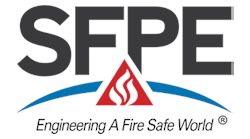Latest from Fire Sprinklers
Sponsored
SPRINGFIELD, ILL. — With a requirement for residential fire sprinklers due to take effect with the 2011 International Residential Code, a number of states are throwing up roadblocks to stop sprinklers.
The International Code Council mandated installation of residential fire sprinklers as part of the International Residential Code during ICC's Annual Business Meeting and Final Action Hearings in Minneapolis in September. The 2009 International Residential Code will require sprinklers in all new one- and two-family residences, including townhouses, as of Jan. 1, 2011, a change approved by more than 73% of the voting members. Approved automatic fire sprinkler systems will be installed in accordance with NFPA 13D.
A statewide legislative threat that would have eliminated the ability of local communities to adopt or enforce requirements for home fire sprinklers has been defeated in Illinois. The Illinois bill died in March, but sprinkler opponents continue to push similar anti-sprinkler legislation in several other states.
“These anti-sprinkler bills have been designed to take a step backward in public safety,” said Jim Shannon, president of the National Fire Protection Association. “The bills ignore the success of a proven technology and inappropriately take away a community’s ability to protect its citizens with this life-saving equipment. The fire service and other sprinkler advocates worked to defeat this safety threat in Illinois, but the threat of anti-sprinkler bills continues to be very real in other states.”
Sprinkler advocates mounted a grassroots lobbying effort to defeat the legislation in the Illinois Senate. A group of supporters lobbied legislators with phone calls, letters to officials and testimony at a committee meeting. The Illinois bill was defeated by a 6-to-3 vote in committee.
“With the vast majority of the fire deaths in this country occurring in homes, it is unconscionable for anyone to stand in the way of efforts to save lives,” added Shannon.
The Plumbing-Heating-Cooling Contractors – National Association believes that residential fire sprinklers will provide opportunities for plumbing contractors to install sprinklers using either combination plumbing/sprinkler systems using PEX pipe or CPVC standalone systems. PHCC-NA has begun educating its members about sprinklers.
A legislative effort in California, however, would make it difficult for plumbing contractors to install sprinklers, reported Steve Lehtonen, outgoing executive director of the California PHCC.
California regulations already prohibit plumbing contractors from installing fire sprinklers without a supplemental license, Lehtonen noted.
Now, however, a couple of new bills have appeared this year that would create additional restrictions on fire protection work. Assembly Bill 660 would create a comprehensive program for the certification and regulation of sprinkler fitters, and would prohibit a person or entity from employing a person to perform work on a fire suppression system unless the workers holds a valid sprinkler fitter or limited scope sprinkler fitter certificate issued by the State Fire Marshal, Lehtonen said.
Another bill, Senate Bill 405, would require every contractor licensed by the state as a sprinkler contractor to employ at least one fire sprinkler supervisor for the purpose of supervising fire sprinkler installation on any sprinkler project. Lehtonen noted that sprinkler contractors already have fire sprinkler supervisors, so the bill is likely aimed at plumbing contractors who also hold sprinkler licenses. The bill would also require the contractor to implement a fire-protection training program for employees that are involved with the installation of fire sprinkler systems.
The National Fire Sprinkler Association has produced an interactive map showing anti-sprinkler legislation in 11 states from Alaska to Maine. The map may be found at http://nfsa.org/NFSAStateMap.xls. Readers can download the map in Microsoft Excel format.
The proposals range from an outright ban in Alaska to more subtle moves, such as Illinois’ attempts to adopt the 2006 IRC not the 2009 version. In North Dakota, a bill that has passed the state Senate would bar local jurisdictions from adopting sprinkler requirements. The most passive-aggressive legislation is under consideration in Utah where the bill would yank the fire official off of the state’s Uniform Building Code Commission.
In response to the continued legislative threat, NFPA is making information available about the anti-sprinkler bills and the life-saving effect of sprinklers. Home fire sprinkler proponents can find the information through the Fire Sprinkler Initiative: Bringing Safety Home Web site, www.firesprinklerinitiative.org.
Robert P. Mader
Bob Mader is the Editorial Director for Penton's mechanical systems brands, including CONTRACTOR magazine, Contracting Business and HPAC Engineering, all of which are part of Penton’s Energy and Buildings Group. He has been with CONTRACTOR since 1984 and with Penton since 2001. His passions are helping contractors improve their businesses, saving energy and the issue of safeguarding our drinking water. He is a graduate of the University of Notre Dame with an A.B. in American Studies with a Communications Concentration.

